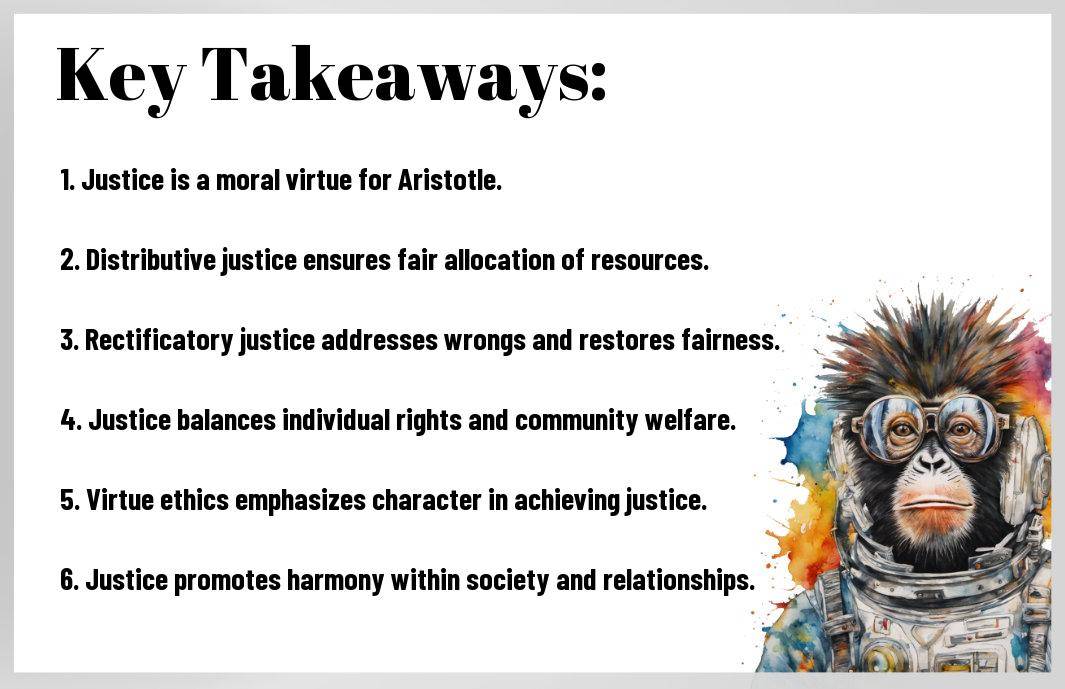
Newsletter Subscribe
Enter your email address below and subscribe to our newsletter

Enter your email address below and subscribe to our newsletter

It’s fascinating to look into the thoughts of Aristotle, especially when it comes to the concept of justice. As I explore what justice meant for him, I find that his ideas remain relevant today, shaping our understanding of fairness and virtue. You might be surprised to learn how his perspective can influence your own views on justice in everyday life. Let’s unravel Aristotle’s thoughts together and see how they can enrich our modern interpretation of this timeless principle.


While pondering what justice means, it’s important to recognize that this concept has shaped philosophical discourse for centuries. Justice is not merely a legal construct; it holds moral significance, often intertwining with notions of fairness and righteousness in human interactions. Aristotle, a prominent figure in ancient philosophy, viewed justice as a virtue that enables individuals to achieve moral excellence. This perspective invites us to consider how our personal actions contribute to the well-being of society as a whole.
For Aristotle, justice is closely linked with virtue and ethics. He believed that to understand justice, one must also comprehend the idea of the ‘good life.’ This good life is achieved through virtuous actions and living in accordance with reason. Justice serves as a guiding principle in our interactions with others, fostering a sense of balance and equality. Aristotle emphasized that it is not merely about legal qualifications but rather about cultivating an individual character that inherently respects the dignity of others.
For Aristotle, justice takes on multiple forms, divided mainly into two categories: distributive and retributive justice. Distributive justice concerns the fair distribution of goods and resources based on merit or need, while retributive justice deals with the fair response to wrongdoing. Understanding these distinctions helps me navigate moral dilemmas, enabling me to reflect on how best to achieve fairness in my interactions with others.
| Type of Justice | Description |
|---|---|
| Distributive Justice | Fair allocation of resources, considering individual contributions. |
| Retributive Justice | Response to wrongdoing, focusing on punishment and restitution. |
| Restorative Justice | Emphasizes repairing harm and restoring relationships. |
| Social Justice | Involves addressing systemic inequalities and promoting equal rights. |
| Commutative Justice | Determines fairness in exchanges and transactions between individuals. |
About the different types of justice, I find it fascinating how each type plays a unique role in society. Recognizing these distinctions prompts me to reflect on the balance between individual needs and the collective good. Each form of justice addresses varied aspects of human relations, and understanding them can empower you to engage more justly in all areas of your life.
The reflections on the different types of justice lead me to appreciate the complexity of ethical considerations in my daily life. It’s vital to seek a balance between what I may want and what is fair for others. Each category highlights the need for a thoughtful approach to creating a just society.
| Type of Justice | Key Features |
|---|---|
| Distributive Justice | Merit and needs-based distribution. |
| Retributive Justice | Fairness in punishment and compensation. |
| Restorative Justice | Healing and restoring relationships. |
| Social Justice | Addressing social inequalities. |
| Commutative Justice | Fairness in interpersonal dealings. |
This understanding of the various types can guide us towards becoming better individuals within our communities, as well as within broader society.
One of the most fascinating aspects of Aristotle’s philosophy is how he intertwines the concepts of virtue and justice. When I think about justice, I can’t help but see it as not just a matter of laws and regulations but as a living ethical framework that guides our actions. Virtues are those habits and traits within us that shape our character and, subsequently, our interactions with others. Aristotle posits that a just person is inherently virtuous—their pursuit of justice is an expression of their moral character. This connection helps me understand that to truly achieve justice, we must actively cultivate virtue within ourselves. Without it, our actions, no matter how well-intentioned, may miss the mark.
At the heart of Aristotle’s teachings is the belief that virtues are crucial to understanding what it means to be just. When I reflect on this, I realize that virtues like courage, temperance, and wisdom are not just abstract ideals—they are crucial components that make us capable of just acts. Justice, in this framework, becomes a balanced and measured response to the needs of others, driven by our cultivated virtues. For Aristotle, a person who is virtuous naturally finds themselves inclined to act justly, as their virtues guide their decisions and behaviors toward the greater good. You can see how this interconnectedness helps us recognize that in promoting justice, we are crucially nurturing our inner virtues as well.
Role of virtue in shaping just actions is significant because your moral character influences every choice you make. In Aristotle’s view, truly just actions arise not from a mere adherence to laws but from the virtues that reside within us. I find this concept empowering; it suggests that if I work on developing my character and embodying virtues, I will naturally align my actions with justice. Each time I choose to practice honesty, fairness, or compassion, I am enhancing my capacity to behave justly. The more virtuous I become, the clearer my understanding of justice becomes, allowing my actions to reflect that understanding.
Another important point is that virtuous behavior doesn’t just affect our individual actions; it has a ripple effect on our communities as well. When you and I demonstrate virtues consistently, we inspire others to do the same. The collective adherence to virtue fosters a just society where individuals actively seek to uplift and support one another. This communal aspect of virtue and justice makes the pursuit even more meaningful, as it reminds us that our personal growth contributes to the greater good. By focusing on our virtues, we become not just better individuals but also better citizens in a just society.
Unlike many modern interpretations of justice that can often focus on individual rights, Aristotle offers a more holistic view that emphasizes the role of justice within the community. He believed that justice was not just a personal virtue but a cornerstone of a well-functioning society. For Aristotle, justice promotes harmony and ensures that individuals can pursue their own good while also contributing to the common good of the community. This interconnectedness between individual and societal well-being makes justice an imperative element in the structure of a just society.
After diving deeper into Aristotle’s philosophy, I’ve come to appreciate how he places significant emphasis on the importance of justice in maintaining order and promoting fairness within a community. Justice acts as a social glue that holds people together, fosters relationships, and enables cooperation. When you think about it, when everyone feels that they are treated fairly and have a stake in the community, it leads to greater social cohesion and trust among its members. The absence of justice, on the other hand, can lead to chaos, inequality, and conflict, ultimately undermining the strength of the community.
Society thrives when justice is aligned with the common good, a theme that resonates deeply with Aristotle’s teachings. I find that his philosophy presents a compelling argument for viewing justice not just as a legal obligation but as a moral imperative that encourages individuals to act in ways that benefit everyone. This means that when we pursue justice, we should also be mindful of how our actions contribute to the overall welfare of our community. It’s a collaborative approach that asks us to consider the needs and rights of others, ultimately fostering a more inclusive and equitable society.
Justice, as Aristotle suggests, is intertwined with the common good. When we pursue justice, it’s not merely about correcting wrongs or punishing transgressions; it’s about creating conditions that allow every member of society to flourish. I believe this viewpoint encourages us to think about our roles not just as individuals but as part of a larger community, where our actions can uplift and support one another. By cultivating a sense of justice that prioritizes the common good, we set the foundation for a harmonious environment where everyone can thrive.

To understand Aristotle’s concept of justice in politics, I find it important to recognize how he believed a just society functions. Aristotle argued that a political system should aim for the common good, balancing private interests with the welfare of the community. He emphasized the importance of virtue in governance, suggesting that leaders should embody the qualities necessary to promote justice among their citizens. This not only encourages good governance but also fosters a sense of responsibility and engagement in civic life among citizens.
To apply Aristotle’s ideas in contemporary politics, I think we should advocate for systems that prioritize fairness and inclusivity. This means participating in local governance, understanding policies, and holding leaders accountable for their actions. When we focus on creating equitable systems that serve everyone, we align closely with Aristotle’s vision of justice, which ultimately contributes to a more harmonious society.
Any discussion about justice that is rooted in Aristotle’s thought can find significance in our daily lives. You might wonder how these philosophical ideas play out beyond the political arena. Aristotle believed that justice should govern personal relationships and interactions, promoting habits of fairness, honesty, and mutual respect in everything we do. It’s about treating others as we would like to be treated, and recognizing our shared humanity.
But it is crucial to realize that implementing Aristotle’s concept of justice in our daily lives goes beyond just our relationships—it involves self-awareness and personal growth. I encourage you to reflect on your actions and decisions, considering whether they align with virtues like fairness and empathy. By doing so, you not only contribute to a just society but also cultivate a sense of personal fulfillment and ethical responsibility in your everyday life.
Keep in mind that while Aristotle’s notions of justice have been highly influential, contemporary philosophers often argue against his views, especially in the context of modern societies. I find it interesting how they emphasize concepts like equality and fairness in ways that diverge from Aristotle’s original ideas. For example, many current interpretations advocate for social justice, which includes addressing systemic inequalities that Aristotle may not have fully considered in his time.
Against this backdrop, some contemporary critics claim that Aristotle’s vision of justice is limited primarily due to its focus on virtue and the individual’s role within the community. Personally, I see how this emphasis can overlook broader societal structures that perpetuate injustice. For instance, Aristotle’s belief that justice is about everyone receiving their due may neglect the systemic barriers some people face, making it difficult for them to even access their ‘fair share’.
Behind Aristotle’s framework, one limitation I’ve noticed is that it primarily caters to a certain level of societal stability and homogeneity that may not exist in diverse, modern communities. The assumption that everyone can achieve virtue while participating in a community can be quite naive when systemic injustices play such significant roles in people’s lives. Consequently, I feel it’s necessary to consider these limitations when applying Aristotle’s views today, as they might not fully capture the complexities of justice we encounter in our contemporary society.
Considering all points I’ve explored about Aristotle’s perspective on justice, it becomes clear that he emphasizes the importance of virtue and proportionality in achieving a just society. Aristotle’s view resonates with me, as he advocates for a balanced approach where justice is not merely about strict adherence to laws but rather about fostering a sense of fairness and moral integrity among individuals. I believe that this notion of justice can be incredibly powerful in guiding our actions and decisions in everyday life, encouraging us to seek what is right and equitable in our relationships with others.
If you’re interested in digging deeper into how Aristotle analyses justice in his work, I highly recommend checking out this resource: How does Aristotle analyse justice in Nicomachean Ethics …. By understanding Aristotle’s insights, you can better appreciate the complexities of justice and how it pertains to both personal and societal levels. Ultimately, I hope this exploration encourages you to reflect on your own definitions of justice and its role in your life.
A: Aristotle defines justice as a virtue that ensures fairness and balance in human interactions. For him, justice involves giving each individual their due, taking into account their circumstances and contributions. He differentiates between distributive justice (distribution of resources according to merit) and corrective justice (rectifying wrongs or imbalances in interactions).
A: Aristotle categorizes justice into two main types: distributive and corrective. Distributive justice pertains to the fair allocation of resources and honors among individuals based on their merit or contribution, while corrective justice aims to restore balance when harms have occurred, ensuring that wrongdoers face consequences appropriate to their actions.
A: In Aristotle’s view, justice is fundamentally linked to virtue. He believes that just actions stem from virtuous character, and only a virtuous individual can truly embody justice. Virtues such as temperance, bravery, and wisdom contribute to a person’s ability to act justly, supporting the idea that ethical behavior is imperative for achieving justice.
A: Aristotle emphasizes that justice is not only a personal trait but also a social principle that underpins the functioning of a community. He argues that justice should promote the common good, as it requires individuals to act with consideration for the welfare of others. A just society fosters cooperation and harmony among its members, reinforcing the importance of civic responsibility.
A: Aristotle introduces the concept of the mean, suggesting that justice is a mean between excess and deficiency. In terms of fairness, it represents the balance between giving too much and too little to individuals based on their needs and contributions. This balanced approach underscores the idea that justice is not an absolute but rather a relative concept that should be tailored to specific situations.
A: Aristotle asserts that justice involves a form of equality, but this equality is contextual. He distinguishes between absolute equality and proportional equality, arguing that individuals should be treated equitably based on their merits and roles within the community. Therefore, justice ensures that individuals receive what is appropriate to them, rather than treating everyone as identical.
A: Aristotle’s understanding of justice has far-reaching implications for contemporary discussions on ethics, governance, and law. His emphasis on fairness, virtue, and the common good informs debates on social justice, distributive policies, and legal systems. By advocating for a balanced approach that considers individual circumstances, his philosophy encourages societies to strive for fairness in distribution while maintaining accountability for actions.